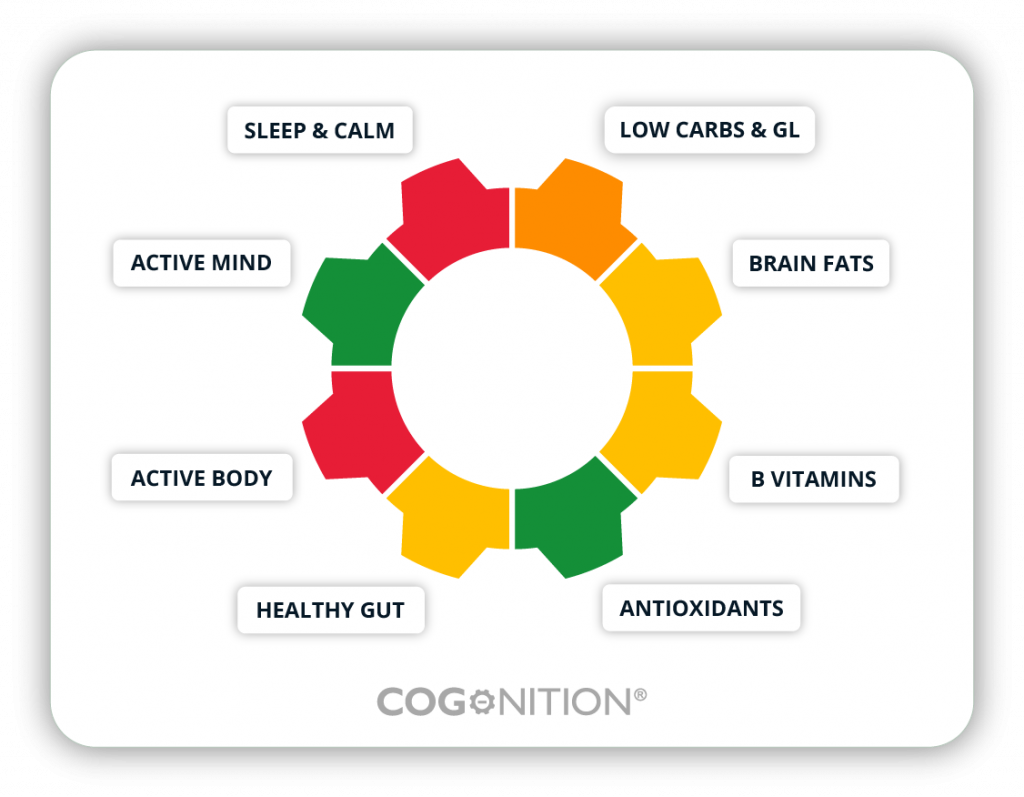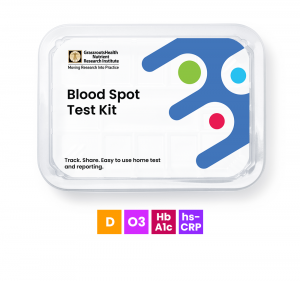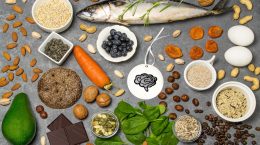Published on April 14, 2025
Your status of vitamin D, omega-3s, and B vitamins, along with blood sugar health and inflammation, can give hints to your risk of dementia and cognitive dysfunction – Measure today with 20% off!
Key Points
- Dementia and Alzheimer’s Disease are preventable; less than 1% of Alzheimer’s is caused by genes so for most of us, the risk for dementia and age-related cognitive decline relates to things we can easily change
- Simple changes to diet and lifestyle can greatly improve cognitive health and lower risk of cognitive decline; which changes are most important can be guided using a simple home blood spot tests to measure vitamin D, omega-3s, blood sugar, inflammation, and B vitamin status
- Homocysteine testing is available through Food for the Brain as an indicator of B vitamin status. The test should be done after fasting for 12 hours with water only being drunk. Both coffee and alcohol affect homocysteine levels, as does eating a protein-rich meal. It is also advised not to take B vitamin supplements during this time or possibly for 24 hours before you test.
Get the Cognitive Health Test Kit for 20% Off – Limited Time Only!
Buy Your at-home Homocysteine Test from Food for the Brain Here – Stock is Limited

Written by Food for the Brain
Dementia, including Alzheimer’s is not only the greatest cause of death entailing huge healthcare costs, it is the major fear for many about aging. The great news is that dementia and Alzheimer’s are preventable. Less than 1% of Alzheimer’s is caused by genes so for most of us, the risk for dementia and age-related cognitive decline relates to things we can easily change.
Food for the Brain has tested almost half a million people with a validated Cognitive Function Test, followed by a questionnaire which calculates your future Dementia Risk Index and crucially, advises what to do about it.
Your risk is divided into eight domains (see image below), highlighting areas to focus on to enable brain and cognitive powers to stay intact.

Here are 25 simple steps you can take to dementia-proof your diet and lifestyle taken from their advice and recent book, Upgrade Your Brain, which gives more detail for those who want to dig deeper.
Brain Fats – Up your brain fats – omega-3, phospholipids and vitamin D
1. Get your omega-3 index above 8%
You can measure your omega-3 index with a home test kit. Psychologists at the Linda Loma University in California did this for a group of older people, publishing their results in the journal Brain Sciences (1). They found that the higher a person’s omega-3 index was, the more white matter there was in their brain and the better they performed in cognitive tests.
The Omega-3 index is part of the Cognitive Health home test kit.
Buy Your Cognitive Health Test Kit Here for 20% Off!
2. Eat oily fish three times a week or SMASH it
S for salmon, M for mackerel, A for anchovies, S for sardines, and H for herrings or kippers. Caviar has the highest known levels of omega-3 DHA, which builds your brain. Even having one serving a week almost halves the risk of Alzheimer’s. (2, 3)
3. Supplement omega-3 fish oils
Aim for any supplement that provides 500mg of omega-3 DHA. This may mean two capsules a day. See this recent study in the American Journal of Clinical Nutrition of over 100,000 people (4). If you’re vegan, supplement with algal omega-3 DHA.
4. Eat an egg and/or nuts and seeds every day
Organic and free range are the preferred options.
Eating two eggs a week halves future risk of Alzheimer’s (5). The best seeds are chia, flax, hemp and pumpkin. The best nuts are walnuts, pecans, and macadamia, but all nuts are a good source of protein and minerals.
5. Exercise outdoors and supplement vitamin D
Low blood levels of vitamin D make cognitive decline 19 times more likely. If your vitamin D level is high, Alzheimer’s disease is 4 times less likely. People who take vitamin D, which is especially important in winter, have a one-third lower risk.
A vitamin D test is part of the Cognitive Health home test kit.
Buy Your Cognitive Health Test Kit Here for 20% Off!
Low Carb and GL – Eat a low-carb, low sugar, low GL diet
6. Avoid sugar and don’t eat junk food
Avoid the white stuff – flour, sugar, rice and especially ultra-processed foods. Fructose and high fructose corn syrup are common sweeteners. They are especially harmful to the brain.
7. Eat your fruit, don’t drink it
Stay away from fruit juices as they contain no fiber but lots of sugar. A glass of orange juice is worth three oranges’ worth of juice, but no fiber. Fiber fills you up.
8. Limit your intake of bread, pasta, and potatoes
If you eat more than 100 to 150 g a day of grains or potatoes, which is one or two servings max, your risk of dementia goes up.
9. Limit alcohol to a glass of wine a day or equivalent
Drinking alcohol, particularly red wine, can lower risk if done in moderation. However, the benefits are limited. Abstinence increases risk, as does having more than 14 units of alcohol a week, according to a study in the British Medical Journal (6).
10. Add C8 oil to your coffee
The brain can run on either glucose or ketones, made in the liver from a ‘medium chain triglyceride’ called C8 oil. Two tablespoons of a C8-rich oil improves cognitive abilities and helps provide the brain with energy (7).
B vitamins – Keep your homocysteine low with B vitamins
11. Test your blood homocysteine level with a home test kit and supplement B vitamins if needed
A level above 10 mmol/l, which is extremely common in people over 60, is strongly associated with accelerated brain shrinkage and increases risk of Alzheimer’s ten-fold. Homocysteine is easily lowered by supplementing vitamin B6, B12 and folate but the amounts needed are much higher if your homocysteine level is high. We recommend everyone to supplement 10 mcg of B12, which is what you’ll find in a good multivitamin but if your homocysteine is raised, you’ll need 500 mcg a day to lower it. It’s completely safe so there’s no harm in taking this much.
Only 44 kits left in stock!
Buy Your at-home Homocysteine Test from Food for the Brain Here
12. Eat a serving a day of both greens and either beans, lentils, nuts or seeds
These are all high in the B vitamin folate as well as vitamin B6. A study in Holland gave 818 people aged 50 to 70 a folic acid supplement of 800mcg for three years, versus a placebo. At the end of the study, compared to those taking the placebo, those taking folic acid were functioning at the equivalent of being 5.5 years younger (8).
Antioxidants – Eat and drink anti-aging antioxidants and polyphenols [4]
13. Eat lots of fresh fruit and veg
The more you eat, the better, though the benefits start to plateau at 500g a day, which is about five to six servings. People who ate the most greens had much less Alzheimer’s-related issues than those who ate the least.(9) . Berries are particularly protective, especially blueberries and strawberries.
14. Drink Tea
The more you drink, the better as confirmed by a recent study from Singapore (8). However, other studies are conflicting (9). My view is to drink tea, green over black, in preference to coffee, and limit your intake to one or two cups a day.
15. Eat dark (70%+) chocolate
The benefit peaks at 10g, or about 3 pieces. More recent studies on cocoa, a rich source of flavanols, have shown improved cognition, possibly by improving circulation (11).
16. Supplement vitamins C and E – and don’t smoke!
A study of 4,740 elderly people in Utah found that those taking both vitamin E and C reduced their risk of developing Alzheimer’s by 23%.
Taking either cut risk by a quarter (12). Overall, a meta-analysis of vitamin C studies concludes thta supplementation lowers risk by about 26% (12). Smokers need at least twice as much vitamin C as non-smokers, just to have basic vitamin C levels in their blood. Smoking also raises homocysteine levels, another risk factor.
Healthy Gut – A healthy gut is a healthy brain [5]
17. Eat plenty of soluble fiber and prebiotic foods
Fiber from foods like oats, chia, and flax seeds benefits our gut microbiome. Prebiotic foods like garlic, artichoke, leeks, and onions nourish and support healthy gut bacteria.
When you eat potatoes or rice, cook them ahead of time. Then, store them in the fridge. Reheating food increases the amount of prebiotics, also known as resistant starch.
Supplementing vitamin C helps promote lactobacillus and bifidobacteria.
Active Body – Exercise and keep physically active [6]
18. Get active for 20 minutes … and build and maintain muscle
Spend at least 20 minutes doing activities such as walking, gardening, housework or repairing things – anything that gets you moving. Don’t limit yourself to ‘exercise’– anything that gives you a faster heart rate and engages different sets of muscles is good. Muscle mass best predicts both your brain volume and risk of cognitive decline in later years (13).
19. Get balancing!
The brain works hard in exercise, especially if it involves complex movements and learning, such as learning to dance, or doing different movements in a yoga or tai chi class or running or walking on uneven surfaces. The brain is processing a lot of information, triggering patterns of muscle movement and keeping you in balance.
Active Mind – Keep yourself socially and intellectually active [7]
20. Read, watch, or listen to stimulating content
A simple yardstick is to ask, ‘Am I learning anything? Am I using my mind?’ Reading books or listening to podcasts can be great ways to stimulate your mind, depending entirely on what you engage with.
21. Be social
Aim to spend at least two hours a week with other people in a social (not work) setting – groups, friends, family, etc.
22. Test your brain in the morning
Do Sudoku, the crossword or Wordle – check out this link. You may prefer an app; two that have high ratings are Brain HQ and Lumosity.
23. Learn something new and challenging
Learning a new language, sport or musical instrument are all good – anything that you keep practicing. This fascinating study looked at the brains of musicians and showed that amateur musicians benefited most (14).
Sleep and Calm – Sleep well, stay calm and live purposefully
24. Avoid alcohol before bed and limit any caffeine intake after midday
Caffeine suppresses melatonin, which helps you sleep, for up to 10 hours.
25. Aim to follow a soothing bedtime routine
Ensure your bedroom is quiet and dark and you are comfortable. Turn off mobile phones and Wi-Fi connections at night. Prioritize relaxing activities in the few hours before you go to bed.
—
While you do not need to implement all 25 things this week, think about what 2-3 things you could focus on this month!
 Start by measuring your Vitamin D, Omega-3 Index, HbA1c for Blood Sugar Status, and hsCRP for Inflammation – Get 20% Off the Cognitive Health Test Kit for 2 weeks only! (Sale ends 4/27/25)
Start by measuring your Vitamin D, Omega-3 Index, HbA1c for Blood Sugar Status, and hsCRP for Inflammation – Get 20% Off the Cognitive Health Test Kit for 2 weeks only! (Sale ends 4/27/25)
Buy Your Cognitive Health Test Kit Here for 20% Off!
Add the Homocysteine Test for B Vitamin Status with the test kit from Food for the Brain – Only 44 left in stock!
Buy Your at-home Homocysteine Test from Food for the Brain Here
Everyone is different but these tests help you know exactly what YOU need and are done in the comfort of your own home and are suitable from age 2+!
Most of all – remember that Alzheimer’s and dementia is preventable and the best time to start is TODAY.
References
1 Hibbeln JR, Nieminen LR, Blasbalg TL, Riggs JA, Lands WE. Healthy intakes of n-3 and n-6 fatty acids: estimations considering worldwide diversity. Am J Clin Nutr. 2006 Jun;83(6 Suppl):1483S-1493S. doi: 10.1093/ajcn/83.6.1483S. PMID: 16841858.
2 Morris MC, Evans DA, Bienias JL, Tangney CC, Bennett DA, Wilson RS, Aggarwal N, Schneider J. Consumption of fish and n-3 fatty acids and risk of incident Alzheimer disease. Arch Neurol. 2003 Jul;60(7):940-6. doi: 10.1001/archneur.60.7.940. PMID: 12873849.
3 Beydoun MA, Beydoun HA, Gamaldo AA, Teel A, Zonderman AB, Wang Y. Epidemiologic studies of modifiable factors associated with cognition and dementia: systematic review and meta-analysis. BMC Public Health. 2014 Jun 24;14:643. doi: 10.1186/1471-2458-14-643. PMID: 24962204; PMCID: PMC4099157.
4 Gong, Q., Xie, L., Bi, M., & Yu, L. (2021). A probability formula derived from serum indicators, age, and comorbidities as an early predictor of dementia in elderly Chinese people. Brain and Behavior 11, e2236. https://doi.org/10.1002/brb3.2236
5 Pan Y, Wallace TC, Karosas T, Bennett DA, Agarwal P, Chung M. Association of Egg Intake With Alzheimer’s Dementia Risk in Older Adults: The Rush Memory and Aging Project. J Nutr. 2024 Jul;154(7):2236-2243. doi: 10.1016/j.tjnut.2024.05.012. Epub 2024 May 22. PMID: 38782209; PMCID: PMC11347793.
6 Sabia S, Fayosse A, Dumurgier J, Dugravot A, Akbaraly T, Britton A, Kivimäki M, Singh-Manoux A. Alcohol consumption and risk of dementia: 23 year follow-up of Whitehall II cohort study. BMJ. 2018 Aug 1;362:k2927. doi: 10.1136/bmj.k2927. PMID: 30068508; PMCID: PMC6066998.
7 Croteau E, Castellano CA, Richard MA, Fortier M, Nugent S, Lepage M, Duchesne S, Whittingstall K, Turcotte ÉE, Bocti C, Fülöp T, Cunnane SC. Ketogenic Medium Chain Triglycerides Increase Brain Energy Metabolism in Alzheimer’s Disease. J Alzheimers Dis. 2018;64(2):551-561. doi: 10.3233/JAD-180202. PMID: 29914035.
8 Durga J, van Boxtel MP, Schouten EG, Kok FJ, Jolles J, Katan MB, Verhoef P. Effect of 3-year folic acid supplementation on cognitive function in older adults in the FACIT trial: a randomised, double blind, controlled trial. Lancet. 2007 Jan 20;369(9557):208-16. doi: 10.1016/S0140-6736(07)60109-3. PMID: 17240287.
9 Devore E et al, ‘Dietary intakes of berries and flavonoids in relation to cognitive decline’, Annals of neurology 2012; 72: 135-43; see also Agarwal P, Holland TM, Wang Y, Bennett DA, Morris MC. Association of Strawberries and Anthocyanidin Intake with Alzheimer’s Dementia Risk. Nutrients. 2019 Dec 14;11(12):3060. doi: 10.3390/nu11123060. PMID: 31847371; PMCID: PMC6950087.
11 Lamport DJ, Pal D, Moutsiana C, Field DT, Williams CM, Spencer JP, Butler LT. The effect of flavanol-rich cocoa on cerebral perfusion in healthy older adults during conscious resting state: a placebo controlled, crossover, acute trial. Psychopharmacology (Berl). 2015 Sep;232(17):3227-34. doi: 10.1007/s00213-015-3972-4. Epub 2015 Jun 7. PMID: 26047963; PMCID: PMC4534492.
12 Basambombo LL, Carmichael PH, Côté S, Laurin D. Use of Vitamin E and C Supplements for the Prevention of Cognitive Decline. Ann Pharmacother. 2017 Feb;51(2):118-124. doi: 10.1177/1060028016673072. Epub 2016 Oct 5. PMID: 2770818; see also Yu JT, Xu W, Tan CC, Andrieu S, Suckling J, Evangelou E, Pan A, Zhang C, Jia J, Feng L, Kua EH, Wang YJ, Wang HF, Tan MS, Li JQ, Hou XH, Wan Y, Tan L, Mok V, Tan L, Dong Q, Touchon J, Gauthier S, Aisen PS, Vellas B. Evidence-based prevention of Alzheimer’s disease: systematic review and meta-analysis of 243 observational prospective studies and 153 randomised controlled trials. J Neurol Neurosurg Psychiatry. 2020;91(11):1201-9. Epub 2020/07/22. doi: 10.1136/jnnp-
13 Wang W, Luo Y, Zhuang Z, Song Z, Huang N, Li Y, Dong X, Xiao W, Zhao Y, Huang T. Total and regional fat-to-muscle mass ratio and risks of incident all-cause dementia, Alzheimer’s disease, and vascular dementia. J Cachexia Sarcopenia Muscle. 2022 Oct;13(5):2447-2455. doi: 10.1002/jcsm.13054. Epub 2022 Jul 20. PMID: 35856185; PMCID: PMC9530585.
14 Beydoun MA, Beydoun HA, Gamaldo AA, Teel A, Zonderman AB, Wang Y. Epidemiologic studies of modifiable factors associated with cognition and dementia: systematic review and meta-analysis. BMC Public Health. 2014 Jun 24;14:643. doi: 10.1186/1471-2458-14-643. PMID: 24962204; PMCID: PMC4099157.






